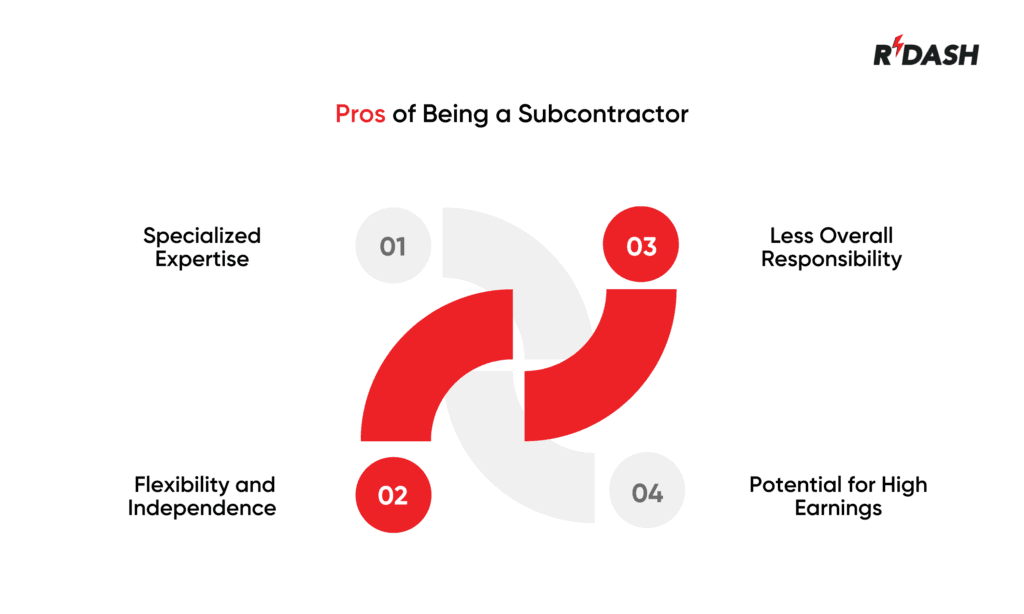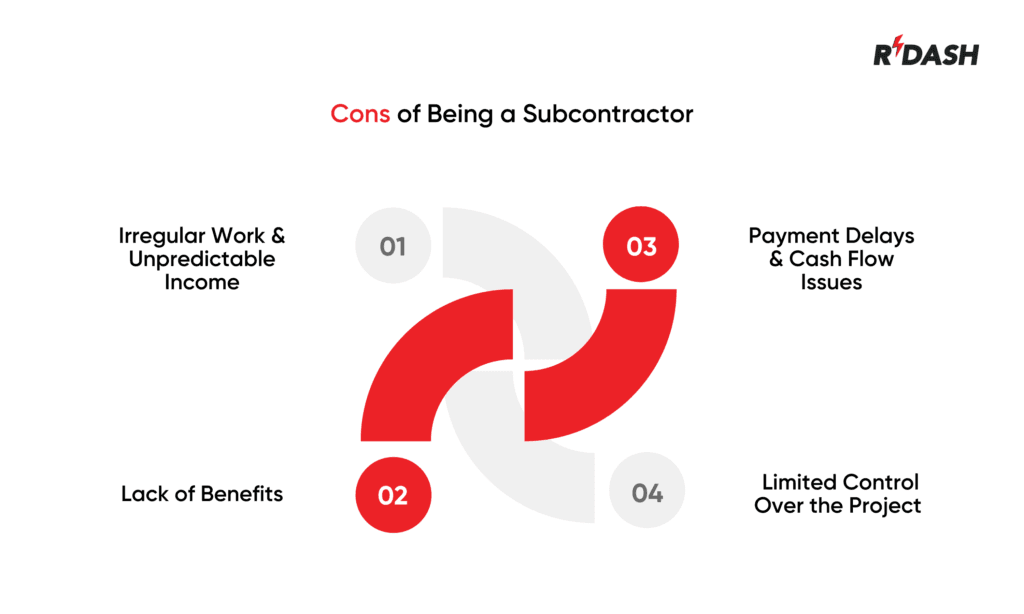Pros and Cons of Being a Subcontractor
The construction industry relies heavily on a wide variety of skilled professionals to complete projects on time and to specification. One of the essential roles within the industry is that of the subcontractor. Subcontractors are hired by general contractors to perform specific tasks on a project, such as electrical work, plumbing, carpentry, and more. While being a subcontractor can offer many rewards, it also comes with its own unique set of challenges. Below, we will explore the pros and cons of being a subcontractor and compare the role with that of a general contractor.
Pros of Being a Subcontractor

1. Specialized Expertise
One of the biggest advantages of being a subcontractor is the opportunity to specialize in a particular trade. Whether it’s electrical work, plumbing, or masonry, subcontractors can focus on their specific skill set. Specialization allows subcontractors to develop a deep understanding of their craft and become experts in their chosen field. This not only makes them more valuable but also helps build a strong reputation in the industry.
Specializing can also lead to higher-paying opportunities. Many subcontractors charge more for specialized work, as clients and contractors alike are willing to pay a premium for expert-level skills. In addition, if you choose a high-demand trade, you can ensure a steady flow of work, further improving job security.
2. Flexibility and Independence
Subcontractors typically have more control over their schedules compared to general contractors. While general contractors manage the entire project, subcontractors are only responsible for their specific tasks. This often translates into greater flexibility. As a subcontractor, you can choose which projects to take on and have the freedom to manage your own time. If you prefer working on projects that fit your skillset or schedule, being a subcontractor gives you that option.
Moreover, subcontractors can decide how much or how little work they wish to take on, offering a level of independence that general contractors don’t have. If you’re someone who values freedom and wants to avoid the micromanagement that comes with overseeing large projects, being a subcontractor can be an attractive option.
3. Less Overall Responsibility
Unlike general contractors, subcontractors are not tasked with overseeing the entire construction project. They are hired for specific tasks, such as electrical work, plumbing, or flooring, which means they don’t have to worry about the overall project timeline, safety compliance, or coordinating multiple teams. This makes subcontracting less stressful, as it focuses on completing the assigned task to the best of your ability rather than managing the entire project’s progress.
For example, while a general contractor has to ensure that the project is completed within budget and on time, subcontractors focus only on completing their part of the project. If you prefer having a narrower focus, subcontracting might be the better choice.
4. Potential for High Earnings
Subcontractors often have the potential to earn more money than general contractors, depending on their specialty. Since they charge for their time and materials, they can earn a higher rate for skilled work. Subcontractors in specialized fields, such as electrical work or HVAC systems, can demand higher rates due to the technical expertise required.
Additionally, many subcontractors work on multiple projects at the same time, allowing them to maximize their income. If you have a strong network and a good reputation, the number of projects you’re hired for can increase, boosting your overall earnings.
Cons of Being a Subcontractor

1. Irregular Work and Unpredictable Income
One of the biggest disadvantages of being a subcontractor is the lack of job stability. Unlike full-time employees, subcontractors are hired on a per-project basis. This means that after completing one job, there may be a gap before the next contract is secured. In periods of low demand, subcontractors may struggle to find work, and their income can be unpredictable.
Subcontractors are also affected by the timing and success of the general contractor’s projects. If the general contractor faces delays or financial troubles, subcontractors may experience late payments or lack of work altogether.
2. Lack of Benefits
Unlike employees of a company, subcontractors are typically responsible for their own benefits, such as health insurance, retirement contributions, and paid leave. As a subcontractor, you are considered an independent contractor, not an employee, which means you need to take care of your taxes, insurance, and other personal benefits.
This can be a significant disadvantage compared to a general contractor, who may have access to more comprehensive employee benefits. Subcontractors must manage their own finances and planning for retirement, which can be more complicated than being part of a larger company with a structured benefits package.
3. Payment Delays and Cash Flow Issues
Another downside is the possibility of payment delays. While general contractors typically receive payments from the client and then pay subcontractors, subcontractors may face delays in getting paid. This can create cash flow problems, especially if the subcontractor is working on multiple projects or requires upfront payments for materials.
In some cases, subcontractors may have to wait weeks or even months before receiving their payment, and some may struggle with clients who delay payments. This creates financial instability for subcontractors, as they rely on these payments to cover ongoing expenses and pay employees, if they have any.
4. Limited Control Over the Project
As a subcontractor, you have limited control over the overall project. While you have control over your work, you don’t have control over the project schedule, resources, or changes in the scope of work. Changes made by the general contractor or the client can affect your work schedule and, in turn, your payment.
For example, if the general contractor makes a last-minute change to the design, you may need to adjust your work, which can cause delays. This lack of control can be frustrating, especially if changes are frequent or not communicated properly.
Subcontractors vs. General Contractors
While both subcontractors and general contractors are essential to the construction process, their roles are very different:
General Contractors:
General contractors are responsible for managing all aspects of the construction process, from scheduling to budget oversight. They oversee the entire project, ensuring that it is completed on time, within budget, and to the required specifications. They are also in charge of hiring subcontractors, ensuring that the project meets safety regulations, and liaising with clients.
Subcontractors:
Subcontractors, on the other hand, concentrate on executing specific tasks within the project. They are hired by the general contractor to handle specialized work. Subcontractors often have expertise in one field, such as plumbing, electrical systems, or carpentry. Although their work is vital to the project’s success, they are not in charge of managing the overall construction process.
Is It Worth Working as a Subcontractor?
Ultimately, whether working as a subcontractor is worth it depends on your career goals and preferences. If you enjoy having the freedom to choose your projects, specialize in a particular trade, and have the potential for high earnings, subcontracting can be a fulfilling career choice. However, if you prefer job stability, employee benefits, and less financial uncertainty, you may find that being a subcontractor has its drawbacks.
For those who are willing to manage the challenges, like irregular income and the responsibility of securing new work, subcontracting can be a highly rewarding profession. It offers the chance to hone your skills, work independently, and enjoy the flexibility that comes with being your own boss.
FAQs
What are the challenges of being a subcontractor?
Challenges include irregular work and income, lack of employee benefits such as health insurance or retirement plans, and the potential for payment delays. Subcontractors also have limited control over the project’s overall timeline and scope.
How do subcontractors get paid?
Subcontractors are typically paid based on the terms set in their contract with the general contractor. This could include hourly rates, daily rates, or payment upon completion of specific project milestones. Payment is usually made once the general contractor is paid by the client, but delays can occur.
Can subcontractors choose the projects they want to work on?
Yes, subcontractors have the freedom to choose which projects to accept based on their skill set, availability, and preference. This is one of the main advantages of working as a subcontractor, as it allows for greater control over the type of work and clients they take on.
Is it difficult to find work as a subcontractor?
Finding work as a subcontractor can vary based on your trade, location, and reputation. Established subcontractors with a good reputation and solid connections may find it easier to secure work, while those just starting out may need to invest more time and effort into networking and bidding for projects.
What qualifications do I need to become a subcontractor?
To become a subcontractor, you typically need to have a skill in a specific trade, such as plumbing, electrical, or carpentry. Many subcontractors also require certifications or licenses depending on the nature of their work and local regulations. Building experience and a good reputation is also crucial for success.






